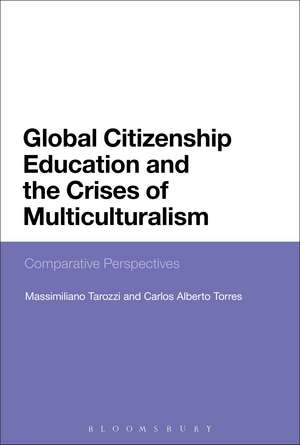Global Citizenship Education and the Crises of Multiculturalism: Comparative Perspectives
Autor Professor Massimiliano Tarozzi, Carlos Alberto Torresen Limba Engleză Paperback – 21 feb 2018
| Toate formatele și edițiile | Preț | Express |
|---|---|---|
| Paperback (1) | 237.02 lei 6-8 săpt. | |
| Bloomsbury Publishing – 21 feb 2018 | 237.02 lei 6-8 săpt. | |
| Hardback (1) | 773.65 lei 6-8 săpt. | |
| Bloomsbury Publishing – 10 aug 2016 | 773.65 lei 6-8 săpt. |
Preț: 237.02 lei
Preț vechi: 305.37 lei
-22% Nou
Puncte Express: 356
Preț estimativ în valută:
45.36€ • 47.69$ • 37.48£
45.36€ • 47.69$ • 37.48£
Carte tipărită la comandă
Livrare economică 17 aprilie-01 mai
Preluare comenzi: 021 569.72.76
Specificații
ISBN-13: 9781474235969
ISBN-10: 1474235964
Pagini: 240
Dimensiuni: 156 x 234 x 16 mm
Greutate: 0.33 kg
Ediția:NIPPOD
Editura: Bloomsbury Publishing
Colecția Bloomsbury Academic
Locul publicării:London, United Kingdom
ISBN-10: 1474235964
Pagini: 240
Dimensiuni: 156 x 234 x 16 mm
Greutate: 0.33 kg
Ediția:NIPPOD
Editura: Bloomsbury Publishing
Colecția Bloomsbury Academic
Locul publicării:London, United Kingdom
Caracteristici
Places the key notion of global citizenship education at the centre of the international debate on education, showing how it can help in dealing with multiculturalism and citizenship deficits
Notă biografică
Massimiliano Tarozzi is Associate Professor in Education at the Department Life Quality Studies, University of Bologna, Italy, and was a Fulbright Visiting Scholar at the University of California Los Angeles (UCLA), USA. He is the editor of Encyclopaideia: Journal of Phenomenology and Education and Chair of the institution governing educational services in Bologna, Italy. Carlos Alberto Torres is Distinguished Professor of Education, UNESCO Chair in Global Learning and Global Citizenship Education, and Director of the Paulo Freire Institute at the University of California Los Angeles (UCLA), USA. He is President of the World Council of Comparative Education Societies, Founding Director of the Paulo Freire Institutes in Sao Paulo, Buenos Aires and at UCLA, and Past President of the Comparative International Education Society (CIES).
Cuprins
Preface1. The Priority of Global Citizenship EducationPart I: Difference and Citizenship2. Theoretical Conceptualization: The Challenge of Diversity3. Multiculturalism: The USA Perspective 4. Interculturalism: The European Union Perspective 5. Comparing Intercultural and Multicultural EducationPart II: Justice in Democracies6. Theoretical Conceptualization:The Challenge of Equality7. From Multiculturalism to Global Citizenship Education ConclusionReferencesIndex
Recenzii
One of the great merits of this work is that it contributes to the provision of a genuinely international dimension to studies in English emerging from Anglophone publishing houses. And there is a desperate need for this ... [Explores] new pathways for a conception of planetary citizenship governed by the quest for greater social justice and the enhancing of intra-human and human-earth relations.
Massimiliano Tarozzi and Carlos Alberto Torres offer a critical reading of citizenship and multiculturalism within a rapidly globalizing educational landscape. This is an important work, one that will contribute to the way scholars and students come to understand the various forces on this contested terrain. Their sharp focus on global inequities that are ironically transacted in schools, particularly in the global North, raises big questions about how we live in the spirit of global citizenship amidst the inherited and perpetuated injustices of our time.
In this provocative book, Massimiliano Tarozzi and Carlos Alberto Torres pose a stark question. With rising political and cultural violence, increased religious and ethnic cleansing and tribalism, and the pressures of governance by global capitalism, how can we contemplate, design, and implement a system of global citizenship based upon equity, universal participation and respect for all? At the center of their answer is Global Citizenship Education (GCE), a key strategy for change.
Massimiliano Tarozzi and Carlos Alberto Torres offer a critical reading of citizenship and multiculturalism within a rapidly globalizing educational landscape. This is an important work, one that will contribute to the way scholars and students come to understand the various forces on this contested terrain. Their sharp focus on global inequities that are ironically transacted in schools, particularly in the global North, raises big questions about how we live in the spirit of global citizenship amidst the inherited and perpetuated injustices of our time.
In this provocative book, Massimiliano Tarozzi and Carlos Alberto Torres pose a stark question. With rising political and cultural violence, increased religious and ethnic cleansing and tribalism, and the pressures of governance by global capitalism, how can we contemplate, design, and implement a system of global citizenship based upon equity, universal participation and respect for all? At the center of their answer is Global Citizenship Education (GCE), a key strategy for change.











